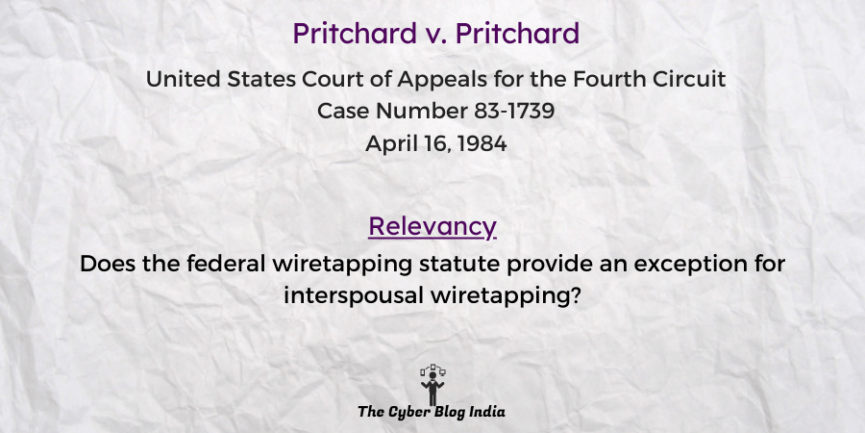Pritchard v. Pritchard

Pritchard v. Pritchard
732 F.2d 372
In the United States Court of Appeals for the Fourth Circuit
Case Number 83-1739
Before Senior Circuit Judge Haynsworth, Circuit Judge Phillips, and Circuit Judge Chapman
Decided on April 16, 1984
Relevancy of the Case: Does the federal wiretapping statute provide an exception for interspousal wiretapping?
Statutes and Provisions Involved
- The Omnibus Crime Control and Safe Streets Act, 18 U.S.C. §§ 2510-2520
Relevant Facts of the Case
- The plaintiff (husband) alleged that the defendant (former wife) had willfully intercepted and recorded his telephone conversations. She attached a wiretapping device to the family phone.
- He claimed that she recorded his conversations without his knowledge or consent.
- The District Court granted the wife’s motion to dismiss the complaint for failure to state a claim. The court relied on the interpretation of the statute in Simpson v. Simpson. In this case, the court held that Congress did not intend for the statute to prohibit interspousal wiretapping on telephones in the marital home.
Prominent Arguments by the Counsels
- The plaintiff’s counsel argued that the statute prohibits all wiretapping activities other than those expressly authorised. He cited cases such as United States v. Jones, 542 F.2d 661 and Kratz v. Kratz, 477 F.Supp. 463 to support his argument.
- The defendant’s counsel primarily relied on the Simpson case to support his argument.
Opinion of the Bench
- While the state courts are more suitable for domestic conflicts, the statute prohibits all wiretapping activities unless specifically excepted.
- There is no express exception for instances of willful and unconsented electronic surveillance between spouses. Nor is there any indication in the statutory language or in the legislative history that Congress intended to imply an exception to facts involving interspousal wiretapping.
Final Decision
- The court reversed the District Court’s decision and remanded it for further proceedings.
